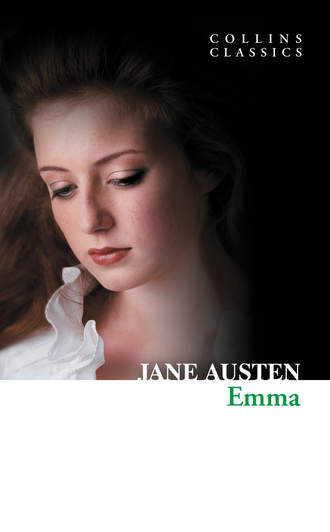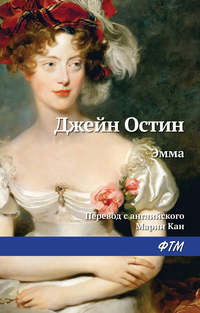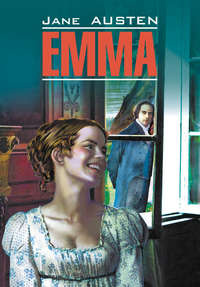
Полная версия
Emma
‘I dare say,’ replied Mrs Weston, smiling, ‘that I thought so then; – but since we have parted, I can never remember Emma’s omitting to do any thing I wished.’
‘There is hardly any desiring to refresh such a memory as that,’ – said Mr Knightley, feelingly; and for a moment or two he had done. ‘But I,’ he soon added, ‘who have had no such charm thrown over my senses, must still see, hear, and remember. Emma is spoiled by being the cleverest of her family. At ten years old, she had the misfortune of being able to answer questions which puzzled her sister at seventeen. She was always quick and assured: Isabella slow and diffident. And ever since she was twelve, Emma has been mistress of the house and of you all. In her mother she lost the only person able to cope with her. She inherits her mother’s talents, and must have been under subjection to her.’
‘I should have been sorry, Mr Knightley, to be dependent on your recommendation, had I quitted Mr Woodhouse’s family and wanted another situation; I do not think you would have spoken a good word for me to any body. I am sure you always thought me unfit for the office I held.’
‘Yes,’ said he, smiling. ‘You are better placed here; very fit for a wife, but not at all for a governess. But you were preparing yourself to be an excellent wife all the time you were at Hartfield. You might not give Emma such a complete education as your powers would seem to promise; but you were receiving a very good education from her, on the very material matrimonial point of submitting your own will, and doing as you were bid; and if Weston had asked me to recommend him a wife, I should certainly have named Miss Taylor.’
‘Thank you. There will be very little merit in making a good wife to such a man as Mr Weston.’
‘Why, to own the truth, I am afraid you are rather thrown away, and that with every disposition to bear, there will be nothing to be borne. We will not despair, however. Weston may grow cross from the wantonness of comfort, or his son may plague him.’
‘I hope not that. – It is not likely. No, Mr Knightley, do not foretell vexation from that quarter.’
‘Not I, indeed. I only name possibilities. I do not pretend to Emma’s genius for foretelling and guessing. I hope, with all my heart, the young man may be a Weston in merit, and a Churchill in fortune. – But Harriet Smith – I have not half done about Harriet Smith. I think her the very worst sort of companion that Emma could possibly have. She knows nothing herself, and looks upon Emma as knowing every thing. She is a flatterer in all her ways; and so much the worse, because undesigned. Her ignorance is hourly flattery. How can Emma imagine she has any thing to learn herself, while Harriet is presenting such a delightful inferiority? And as for Harriet, I will venture to say that she cannot gain by the acquaintance. Hartfield will only put her out of conceit with all the other places she belongs to. She will grow just refined enough to be uncomfortable with those among whom birth and circumstances have placed her home. I am much mistaken if Emma’s doctrines give any strength of mind, or tend at all to make a girl adapt herself rationally to the varieties of her situation in life. – They only give a little polish.’
‘I either depend more upon Emma’s good sense than you do, or am more anxious for her present comfort; for I cannot lament the acquaintance. How well she looked last night!’
‘Oh! you would rather talk of her person than her mind, would you? Very well; I shall not attempt to deny Emma’s being pretty.’
‘Pretty! say beautiful rather. Can you imagine any thing nearer perfect beauty than Emma altogether – face and figure?’
‘I do not know what I could imagine, but I confess that I have seldom seen a face or figure more pleasing to me than hers. But I am a partial old friend.’
‘Such an eye! – the true hazel eye – and so brilliant! regular features, open countenance, with a complexion! oh! what a bloom of full health, and such a pretty height and size; such a firm and upright figure! There is health, not merely in her bloom, but in her air, her head, her glance. One hears sometimes of a child being “the picture of health;” now, Emma always gives me the idea of being the complete picture of grown-up health. She is loveliness itself. Mr Knightley, is not she?’
‘I have not a fault to find with her person,’ he replied. ‘I think her all you describe. I love to look at her; and I will add this praise, that I do not think her personally vain. Considering how very handsome she is, she appears to be little occupied with it; her vanity lies another way. Mrs Weston, I am not to be talked out of my dislike of Harriet Smith, or my dread of its doing them both harm.’
‘And I, Mr Knightley, am equally stout in my confidence of its not doing them any harm. With all dear Emma’s little faults, she is an excellent creature. Where shall we see a better daughter, or a kinder sister, or a truer friend? No, no; she has qualities which may be trusted; she will never lead any one really wrong; she will make no lasting blunder; where Emma errs once, she is in the right a hundred times.’
‘Very well; I will not plague you any more. Emma shall be an angel, and I will keep my spleen to myself till Christmas brings John and Isabella. John loves Emma with a reasonable and therefore not a blind affection, and Isabella always thinks as he does; except when he is not quite frightened enough about the children. I am sure of having their opinions with me.’
‘I know that you all love her really too well to be unjust or unkind; but excuse me, Mr Knightley, if I take the liberty (I consider myself, you know, as having somewhat of the privilege of speech that Emma’s mother might have had) the liberty of hinting that I do not think any possible good can arise from Harriet Smith’s intimacy being made a matter of much discussion among you. Pray excuse me; but supposing any little inconvenience may be apprehended from the intimacy, it cannot be expected that Emma, accountable to nobody but her father, who perfectly approves the acquaintance, should put an end to it, so long as it is a source of pleasure to herself. It has been so many years my province to give advice, that you cannot be surprized, Mr Knightley, at this little remains of office.’
‘Not at all,’ cried he; ‘I am much obliged to you for it. It is very good advice, and it shall have a better fate than your advice has often found; for it shall be attended to.’
‘Mrs John Knightley is easily alarmed, and might be made unhappy about her sister.’
‘Be satisfied,’ said he, ‘I will not raise any outcry. I will keep my ill-humour to myself. I have a very sincere interest in Emma. Isabella does not seem more my sister; has never excited a greater interest; perhaps hardly so great. There is an anxiety, a curiosity in what one feels for Emma. I wonder what will become of her!’
‘So do I,’ said Mrs Weston gently, ‘very much.’
‘She always declares she will never marry, which, of course, means just nothing at all. But I have no idea that she has yet ever seen a man she cared for. It would not be a bad thing for her to be very much in love with a proper object. I should like to see Emma in love, and in some doubt of a return; it would do her good. But there is nobody hereabouts to attach her; and she goes so seldom from home.’
‘There does, indeed, seem as little to tempt her to break her resolution at present,’ said Mrs Weston, ‘as can well be; and while she is so happy at Hartfield, I cannot wish her to be forming any attachment which would be creating such difficulties on poor Mr Woodhouse’s account. I do not recommend matrimony at present to Emma, though I mean no slight to the state, I assure you.’
Part of her meaning was to conceal some favourite thoughts of her own and Mr Weston’s on the subject, as much as possible. There were wishes at Randalls respecting Emma’s destiny, but it was not desirable to have them suspected; and the quiet transition which Mr Knightley soon afterwards made to ‘What does Weston think of the weather; shall we have rain?’ convinced her that he had nothing more to say or surmise about Hartfield.
CHAPTER 6
Emma could not feel a doubt of having given Harriet’s fancy a proper direction and raised the gratitude of her young vanity to a very good purpose, for she found her decidedly more sensible than before of Mr Elton’s being a remarkably handsome man, with most agreeable manners; and as she had no hesitation in following up the assurance of his admiration by agreeable hints, she was soon pretty confident of creating as much liking on Harriet’s side, as there could be any occasion for. She was quite convinced of Mr Elton’s being in the fairest way of falling in love, if not in love already. She had no scruple with regard to him. He talked of Harriet, and praised her so warmly, that she could not suppose any thing wanting which a little time would not add. His perception of the striking improvement of Harriet’s manner, since her introduction at Hartfield, was not one of the least agreeable proofs of his growing attachment.
‘You have given Miss Smith all that she required,’ said he; ‘you have made her graceful and easy. She was a beautiful creature when she came to you, but, in my opinion, the attractions you have added are infinitely superior to what she received from nature.’
‘I am glad you think I have been useful to her; but Harriet only wanted drawing out, and receiving a few, very few hints. She had all the natural grace of sweetness of temper and artlessness in herself. I have done very little.’
‘If it were admissible to contradict a lady,’ said the gallant Mr Elton –
‘I have perhaps given her a little more decision of character, have taught her to think on points which had not fallen in her way before.’
‘Exactly so; that is what principally strikes me. So much superadded decision of character! Skilful has been the hand!’
‘Great has been the pleasure, I am sure. I never met with a disposition more truly amiable.’
‘I have no doubt of it.’ And it was spoken with a sort of sighing animation, which had a vast deal of the lover. She was not less pleased another day with the manner in which he seconded a sudden wish of hers, to have Harriet’s picture.
‘Did you ever have your likeness taken, Harriet?’ said she: ‘did you ever sit for your picture?’
Harriet was on the point of leaving the room, and only stopt to say, with a very interesting naïveté,
‘Oh! dear, no, never.’
No sooner was she out of sight, than Emma exclaimed,
‘What an exquisite possession a good picture of her would be! I would give any money for it. I almost long to attempt her likeness myself. You do not know it I dare say, but two or three years ago I had a great passion for taking likenesses, and attempted several of my friends, and was thought to have a tolerable eye in general. But from one cause or another, I gave it up in disgust. But really, I could almost venture, if Harriet would sit to me. It would be such a delight to have her picture!’
‘Let me entreat you,’ cried Mr Elton; ‘it would indeed be a delight! Let me entreat you, Miss Woodhouse, to exercise so charming a talent in favour of your friend. I know what your drawings are. How could you suppose me ignorant? Is not this room rich in specimens of your landscapes and flowers; and has not Mrs Weston some inimitable figure-pieces in her drawing-room, at Randalls?’
Yes, good man! – thought Emma – but what has all that to do with taking likenesses? You know nothing of drawing. Don’t pretend to be in raptures about mine. Keep your raptures for Harriet’s face. ‘Well, if you give me such kind encouragement, Mr Elton, I believe I shall try what I can do. Harriet’s features are very delicate, which makes a likeness difficult; and yet there is a peculiarity in the shape of the eye and the lines about the mouth which one ought to catch.’
‘Exactly so – The shape of the eye and the lines about the mouth – I have not a doubt of your success. Pray, pray attempt it. As you will do it, it will indeed, to use your own words, be an exquisite possession.’
‘But I am afraid, Mr Elton, Harriet will not like to sit. She thinks so little of her own beauty. Did not you observe her manner of answering me? How completely it meant, “why should my picture be drawn?”’
‘Oh! yes, I observed it, I assure you. It was not lost on me. But still I cannot imagine she would not be persuaded.’
Harriet was soon back again, and the proposal almost immediately made; and she had no scruples which could stand many minutes against the earnest pressing of both the others. Emma wished to go to work directly, and therefore produced the portfolio containing her various attempts at portraits, for not one of them had ever been finished, that they might decide together on the best size for Harriet. Her many beginnings were displayed. Miniatures, half-lengths, whole-lengths, pencil, crayon, and water-colours had been all tried in turn. She had always wanted to do every thing, and had made more progress both in drawing and music than many might have done with so little labour as she would ever submit to. She played and sang; – and drew in almost every style; but steadiness had always been wanting; and in nothing had she approached the degree of excellence which she would have been glad to command, and ought not to have failed of. She was not much deceived as to her own skill either as an artist or a musician, but she was not unwilling to have others deceived, or sorry to know her reputation for accomplishment often higher than it deserved.
There was merit in every drawing – in the least finished, perhaps the most; her style was spirited; but had there been much less, or had there been ten times more, the delight and admiration of her two companions would have been the same. They were both in ecstasies. A likeness pleases every body; and Miss Woodhouse’s performances must be capital.
‘No great variety of faces for you,’ said Emma. ‘I had only my own family to study from. There is my father – another of my father – but the idea of sitting for his picture made him so nervous, that I could only take him by stealth; neither of them very like therefore. Mrs Weston again, and again, and again, you see. Dear Mrs Weston! always my kindest friend on every occasion. She would sit whenever I asked her. There is my sister; and really quite her own little elegant figure! – and the face not unlike. I should have made a good likeness of her, if she would have sat longer, but she was in such a hurry to have me draw her four children that she would not be quiet. Then, here come all my attempts at three of those four children; – there they are, Henry and John and Bella, from one end of the sheet to the other, and any one of them might do for any one of the rest. She was so eager to have them drawn that I could not refuse; but there is no making children of three or four years old stand still you know; nor can it be very easy to take any likeness of them, beyond the air and complexion, unless they are coarser featured than any mamma’s children ever were. Here is my sketch of the fourth, who was a baby. I took him as he was sleeping on the sofa, and it is as strong a likeness of his cockade as you would wish to see. He had nestled down his head most conveniently. That’s very like. I am rather proud of little George. The corner of the sofa is very good. Then here is my last’ – unclosing a pretty sketch of a gentleman in small size, whole-length – ‘my last and my best – my brother, Mr John Knightley. – This did not want much of being finished, when I put it away in a pet, and vowed I would never take another likeness. I could not help being provoked; for after all my pains, and when I had really made a very good likeness of it – (Mrs Weston and I were quite agreed in thinking it very like) – only too handsome – too flattering – but that was a fault on the right side – after all this, came poor dear Isabella’s cold approbation of – “Yes, it was a little like – but to be sure it did not do him justice.” We had had a great deal of trouble in persuading him to sit at all. It was made a great favour of; and altogether it was more than I could bear; and so I never would finish it, to have it apologized over as an unfavourable likeness, to every morning visitor in Brunswick Square; – and, as I said, I did then forswear ever drawing any body again. But for Harriet’s sake, or rather for my own, and as there are no husbands and wives in the case at present, I will break my resolution now.’
Mr Elton seemed very properly struck and delighted by the idea, and was repeating, ‘No husbands and wives in the case at present indeed, as you observe. Exactly so. No husbands and wives,’ with so interesting a consciousness, that Emma began to consider whether she had not better leave them together at once. But as she wanted to be drawing, the declaration must wait a little longer.
She had soon fixed on the size and sort of portrait. It was to be a whole-length in water-colours, like Mr John Knightley’s, and was destined, if she could please herself, to hold a very honourable station over the mantelpiece.
The sitting began; and Harriet, smiling and blushing, and afraid of not keeping her attitude and countenance, presented a very sweet mixture of youthful expression to the steady eyes of the artist. But there was no doing any thing, with Mr Elton fidgeting behind her and watching every touch. She gave him credit for stationing himself where he might gaze and gaze again without offence; but was really obliged to put an end to it, and request him to place himself elsewhere. It then occurred to her to employ him in reading.
‘If he would be so good as to read to them, it would be a kindness indeed! It would amuse away the difficulties of her part, and lessen the irksomeness of Miss Smith’s.’
Mr Elton was only too happy. Harriet listened, and Emma drew in peace. She must allow him to be still frequently coming to look; any thing less would certainly have been too little in a lover; and he was ready at the smallest intermission of the pencil, to jump up and see the progress, and be charmed. – There was no being displeased with such an encourager, for his admiration made him discern a likeness almost before it was possible. She could not respect his eye, but his love and his complaisance were unexceptionable.
The sitting was altogether very satisfactory; she was quite enough pleased with the first day’s sketch to wish to go on. There was no want of likeness, she had been fortunate in the attitude, and as she meant to throw in a little improvement to the figure, to give a little more height, and considerably more elegance, she had great confidence of its being in every way a pretty drawing at last, and of its filling its destined place with credit to them both – a standing memorial of the beauty of one, the skill of the other, and the friendship of both; with as many other agreeable associations as Mr Elton’s very promising attachment was likely to add.
Harriet was to sit again the next day; and Mr Elton, just as he ought, entreated for the permission of attending and reading to them again.
‘By all means. We shall be most happy to consider you as one of the party.’
The same civilities and courtesies, the same success and satisfaction, took place on the morrow, and accompanied the whole progress of the picture, which was rapid and happy. Every body who saw it was pleased, but Mr Elton was in continual raptures, and defended it through every criticism.
‘Miss Woodhouse has given her friend the only beauty she wanted,’ – observed Mrs Weston to him – not in the least suspecting that she was addressing a lover. – ‘The expression of the eye is most correct, but Miss Smith has not those eyebrows and eyelashes. It is the fault of her face that she has them not.’
‘Do you think so?’ replied he. ‘I cannot agree with you. It appears to me a most perfect resemblance in every feature. I never saw such a likeness in my life. We must allow for the effect of shade, you know.’
‘You have made her too tall, Emma,’ said Mr Knightley.
Emma knew that she had, but would not own it; and Mr Elton warmly added,
‘Oh no! certainly not too tall; not in the least too tall. Consider, she is sitting down – which naturally presents a different – which in short gives exactly the idea – and the proportions must be preserved, you know. Proportions, fore-shortening. – Oh no! it gives one exactly the idea of such a height as Miss Smith’s. Exactly so indeed!’
‘It is very pretty,’ said Mr Woodhouse. ‘So prettily done! Just as your drawings always are, my dear. I do not know any body who draws so well as you do. The only thing I do not thoroughly like is, that she seems to be sitting out of doors, with only a little shawl over her shoulders – and it makes one think she must catch cold.’
‘But, my dear papa, it is supposed to be summer; a warm day in summer. Look at the tree.’
‘But it is never safe to sit out of doors, my dear.’
‘You, sir, may say any thing,’ cried Mr Elton, ‘but I must confess that I regard it as a most happy thought, the placing of Miss Smith out of doors; and the tree is touched with such inimitable spirit! Any other situation would have been much less in character. The naïveté of Miss Smith’s manners – and altogether – Oh, it is most admirable! I cannot keep my eyes from it. I never saw such a likeness.’
The next thing wanted was to get the picture framed; and here were a few difficulties. It must be done directly; it must be done in London; the order must go through the hands of some intelligent person whose taste could be depended on; and Isabella, the usual doer of all commissions, must not be applied to, because it was December, and Mr Woodhouse could not bear the idea of her stirring out of her house in the fogs of December. But no sooner was the distress known to Mr Elton, than it was removed. His gallantry was always on the alert. ‘Might he be trusted with the commission, what infinite pleasure should he have in executing it! he could ride to London at any time. It was impossible to say how much he should be gratified by being employed on such an errand.’
‘He was too good! – she could not endure the thought! – she would not give him such a troublesome office for the world’ – brought on the desired repetition of entreaties and assurances, – and a very few minutes settled the business.
Mr Elton was to take the drawing to London, chuse the frame, and give the directions; and Emma thought she could so pack it as to ensure its safety without much incommoding him, while he seemed mostly fearful of not being incommoded enough.
‘What a precious deposit!’ said he with a tender sigh, as he received it.
‘This man is almost too gallant to be in love,’ thought Emma. ‘I should say so, but that I suppose there may be a hundred different ways of being in love. He is an excellent young man, and will suit Harriet exactly; it will be an “Exactly so,” as he says himself; but he does sigh and languish, and study for compliments rather more than I could endure as a principal. I come in for a pretty good share as a second. But it is his gratitude on Harriet’s account.’
CHAPTER 7
The very day of Mr Elton’s going to London produced a fresh occasion for Emma’s services towards her friend. Harriet had been at Hartfield, as usual, soon after breakfast; and, after a time, had gone home to return again to dinner: she returned, and sooner than had been talked of, and with an agitated, hurried look, announcing something extraordinary to have happened which she was longing to tell. Half a minute brought it all out. She had heard, as soon as she got back to Mrs Goddard’s, that Mr Martin had been there an hour before, and finding she was not at home, nor particularly expected, had left a little parcel for her from one of his sisters, and gone away; and on opening this parcel, she had actually found, besides the two songs which she had lent Elizabeth to copy, a letter to herself; and this letter was from him, from Mr Martin, and contained a direct proposal of marriage. ‘Who could have thought it? She was so surprized she did not know what to do. Yes, quite a proposal of marriage; and a very good letter, at least she thought so. And he wrote as if he really loved her very much – but she did not know – and so, she was come as fast as she could to ask Miss Woodhouse what she should do.’ Emma was half-ashamed of her friend for seeming so pleased and so doubtful.








![Love and Freindship [sic]](/covers_200/25019987.jpg)
